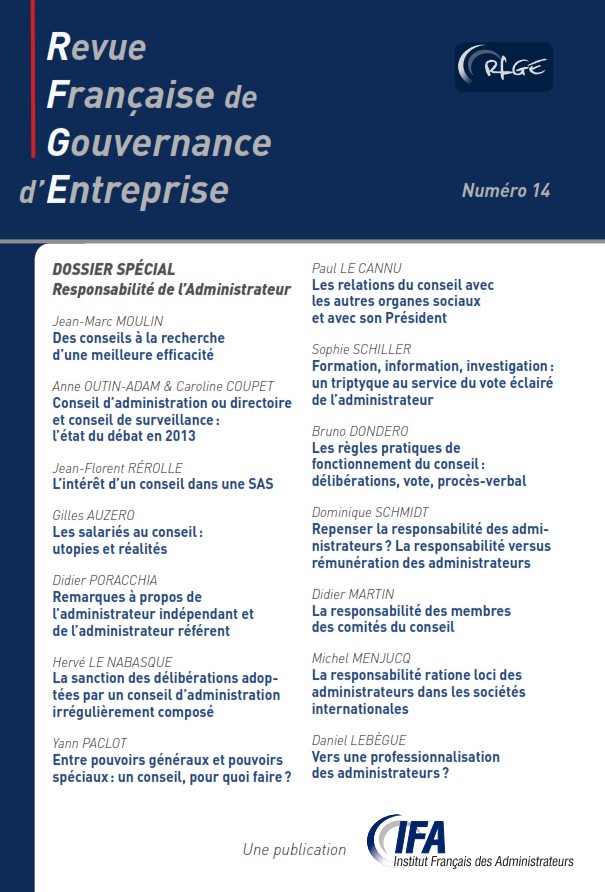Gouvernance | Page 2
Gouvernance normes de droit
UK Corporate Governance: Change Has Got to Come!
Ivan Tchotourian 27 novembre 2016
Le 10 octobre, The National Law Review a publié un article intéressant revenant sur la situation britannique et les réformes à venir en gouvernance d’entreprise : « UK Corporate Governance: Change Has Got to Come! ».
A number of themes trailed in UK’s Theresa May’s first speech after securing the Conservative nomination, were repeated at last week’s Conservative Party conference in Birmingham. The new Government reiterated its intention to occupy the centre ground of British politics and the delivery of this political objective will undoubtedly have implications for corporate Britain – in the words of the Prime Minister “ a change has got to come.”
At the moment we are short on detail, but the Government has promised to publish plans later this year to have consumers and workers represented on company boards of directors. Speech soundbites also focussed on executive pay, the taxation of international business and the payment of excessive dividends, together with a more general promise to protect and enhance workers’ rights.
À la prochaine…
Ivan Tchotourian
autres publications Gouvernance normes de droit
Gouvernance d’entreprise : le Parlement britannique lance une consultation
Ivan Tchotourian 19 septembre 2016
En Grande-Bretagne, The Business, Innovation, and Skills (BIS) Committee vient de lancer une consultation publique sur la gouvernance d’entreprise : « Corporate Governance inquiry launched ».
The Business, Innovation, and Skills (BIS) Committee has today launched an inquiry on corporate governance, focussing on executive pay, directors duties, and the composition of boardrooms, including worker representation and gender balance in executive positions.
Les questions abordées sont très intéressantes :
Directors Duties
- Is company law sufficiently clear on the roles of directors and non-executive directors, and are those duties the right ones? If not, how should it be amended?
- Is the duty to promote the long-term success of the company clear and enforceable?
- How are the interests of shareholders, current and former employees best balanced?
- How best should the decisions of Boards be scrutinised and open to challenge?
- Should there be greater alignment between the rules governing public and private companies? What would be the consequences of this?
- Should additional duties be placed on companies to promote greater transparency, e.g. around the roles of advisors. If so, what should be published and why? What would the impact of this be on business behaviour and costs to business?
- How effectively have the provisions of the 1992 Cadbury report been embedded? How best can shareholders have confidence that Executives are subject to independent challenge?
- Should Government regulate or rely on guidance and professional bodies to ensure that Directors fulfil their duties effectively?
Executive pay
- What factors have influenced the steep rise in executive pay over the past 30 years relative to salaries of more junior employees?
- How should executive pay take account of companies’ long-term performance?
- Should executive pay reflect the value added by executives to companies relative to more junior employees? If so, how?
- What evidence is there that executive pay is too high? How, if at all, should Government seek to influence or control executive pay?
- Do recent high-profile shareholder actions demonstrate that the current framework for controlling executive pay is bedding in effectively? Should shareholders have a greater role?
Composition of Boards
- What evidence is there that more diverse company boards perform better?
- How should greater diversity of board membership be achieved? What should diversity include, e.g. gender, ethnicity, age, sexuality, disability, experience, socio-economic background?
- Should there be worker representation on boards and/or remuneration committees? If so, what form should this take?
- What more should be done to increase the number of women in Executive positions on boards?
Attention : la réponse est à envoyer pour le 26 octobre 2016 !
À la prochaine…
Ivan Tchotourian
autres publications Gouvernance
Volkswagen : quelle leçon pour la gouvernance ?
Ivan Tchotourian 17 mai 2016
Le professeur John Armour offre une analyse synthétique des liens entre l’affaire Volkswagen et la gouvernance d’entreprise dans un billet de blog paru sur le site de l’Université d’Oxford : « Volkswagen’s Emissions Scandal: Lessons for Corporate Governance? (Part 1) ».
At this point, it remains unclear precisely how and why VW came to do this. US law firm Jones Day have been retained by VW to conduct an internal investigation, the results of which are due in the fourth quarter of 2016. VW’s official line is that this was the result of the actions of a few engineers and programmers. Let’s call this the ‘rogue technicians’ theory. However, with such a large number of vehicles, over a period of about seven years, it seems—as was argued in a recent post by J.S. Nelson—more plausible that senior management might have been aware of the scheme (or warning signs of it) at some point prior to its revelation. Let’s call this the ‘management inaction’ theory.
J’ai hâte de lire la partie 2 !
À la prochaine…
Ivan Tchotourian
Gouvernance Normes d'encadrement
RSE : à la recherche de la bonne recette
Ivan Tchotourian 5 mai 2016
Très intéressant article dans le dernier journal Les affaires (30 avril 2016) qui touche la responsabilité sociétale et la gouvernance des entreprises (ici).
Si le terme de responsabilité sociale d’entreprise (RSE) regroupe des enjeux aussi variés que l’éthique, la gouvernance, les retombées économiques locales et les droits de la personne, c’est surtout de développement durable qu’on a discuté lors de la conférence…
À la prochaine…
Ivan Tchotourian
autres publications engagement et activisme actionnarial mission et composition du conseil d'administration Normes d'encadrement
Besoin d’une réforme en gouvernance : le professeur Gordon s’exprime
Ivan Tchotourian 29 mars 2016
Jeffrey N. Gordon connu pour ses écrits dans le domaine de la gouvernance d’entreprise offre une belle tribune dans le Morning Consul du 22 mars 2016. Intitulé « Shareholder Activism, the Short-Termist Red-Herring, and the Need for Corporate Governance Reform », cet écrit revient sur l’activisme des hedge funds et la concentration dont ils font l’objet.
Jeffrey Gordon demande qu’une réforme de la gouvernance d’entreprise soit mise en place, non pour contrer l’activisme mais pour réformer le conseil d’administration et lui donner un rôle nouveau `s’assurer de la crédibilité de la haute direction.
It’s the attack of hedge funds, shareholder activists looking for short term gain even at the expense of investments that would produce higher returns over the long run, and, along the way, would lead to employment gains and then wage gains. What follows, then, is a prescription for changes in tax policy and legal rules that would hamper the activists, all to promote the “long run.” But this is a misdiagnosis, which fails to realize that the shareholders activists’ success reveals a major shortfall in corporate governance for large public corporations.
(…) Reform should move not in the direction of closing down the activists who are bringing the news about this design flaw. Rather we should develop a new role for the board: credibly evaluating and then verifying that management’s strategy is best for the company (or making changes if it is not). Boards need directors who will have that credibility, which is won through deep knowledge about the company and its industry and an appropriate time commitment.
À la prochaine…
Ivan Tchotourian
conférences devoirs des administrateurs Gouvernance Normes d'encadrement normes de droit normes de marché Nouvelles diverses objectifs de l'entreprise
Colloque en gouvernance : cela approche !
Ivan Tchotourian 21 mars 2016
Bonjour à toutes et à tous, je vous rappelle que le colloque sur les enjeux contemporains de gouvernance d’entreprise organisé par le Centre d’études en droit économique (Faculté de droit de l’Université Laval) et la Chaire de recherche en gouvernance de sociétés (FSA de l’Université Laval) arrive bientôt !
Vendredi 1er avril 2016
8 h 30 à 17 h
Salon Hermès (salle 1651)
Pavillon Palasis-Prince
Cette rencontre du droit, de l’administration et de la finance permettra aux professionnels
et aux étudiants de confronter leurs point de vue sur plusieurs thématiques :
- Composition et mission des conseils d’administration
- Devoir des administrateurs
- Contenu et légitimité des pouvoirs des actionnaires
- Activisme actionnarial
- Opportunité de normes de divulgation ou impératives
- Place des préoccupations liées à la responsabilité sociétale
Information et inscription : www.fsa.ulaval.ca/gouvernance-entreprises
Formation d’un dispensateur reconnu aux fins de la formation continue obligatoire du Barreau du Québec pour une durée de 5 heures.
À la prochaine…
Ivan Tchotourian
autres publications Gouvernance normes de droit
RFGE n0 14 : un sommaire qui donne envie
Ivan Tchotourian 13 mars 2016
Le n0 14 de la Revue française de gouvernance d’entreprise (RFGE) nous offre un beau numéro puisqu’ouvert aux problématique juridiques de la gouvernance des entreprises.
Je vous laisse découvrir le sommaire :
- Jean-Marc MOULIN – Des conseils à la recherche d’une meilleure efficacité
- Anne OUTIN-ADAM & Caroline COUPET – Conseil d’administration ou directoire et conseil de surveillance : l’état du débat en 2013
- Jean-Florent RÉROLLE – L’intérêt d’un conseil dans une SAS
- Gilles AUZERO – Les salariés au conseil : utopies et réalités
- Didier PORACCHIA -Remarques à propos de l’administrateur indépendant et de l’administrateur référent
- Hervé LE NABASQUE – La sanction des délibérations adoptées par un conseil d’administration irrégulièrement composé
- Yann PACLOT -Entre pouvoirs généraux et pouvoirs spéciaux : un conseil, pour quoi faire ?
- Paul LE CANNU – Les relations du conseil avec les autres organes sociaux et avec son Président
- Sophie SCHILLER -Formation, information, investigation : un triptyque au service du vote éclairé de l’administrateur
- Bruno DONDERO – Les règles pratiques de fonctionnement du conseil : délibérations, vote, procès-verbal
- Dominique SCHMIDT – Repenser la responsabilité des administrateurs ? La responsabilité versus rémunération des administrateurs
- Didier MARTIN – La responsabilité des membres des comités du conseil
- Michel MENJUCQ – La responsabilité ratione loci des administrateurs dans les sociétés internationales
- Daniel LEBÈGUE – Vers une professionnalisation des administrateurs ?
Pour commander la RFGE, cliquez ici.
À la prochaine…
Ivan Tchotourian


